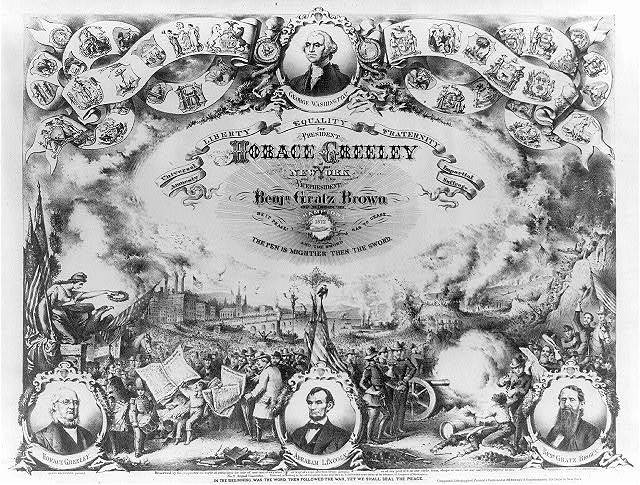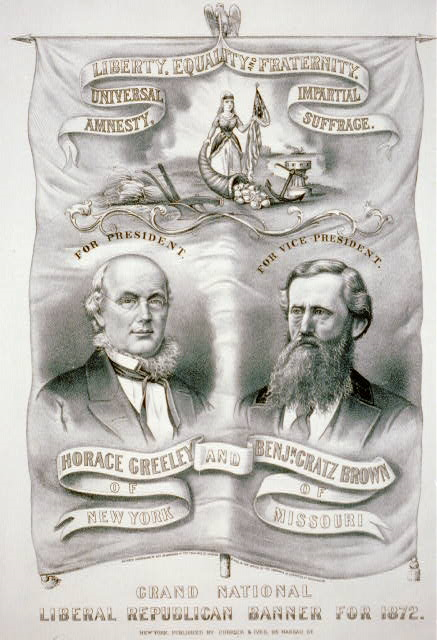|
Liberal Republican Party
The Liberal Republican Party was an American political party that was organized in May 1872 to oppose the reelection of President Ulysses S. Grant and his Radical Republican supporters in the presidential election of 1872. The party emerged in Missouri under the leadership of Senator Carl Schurz and soon attracted other opponents of Grant; Liberal Republicans decried the scandals of the Grant administration and sought civil service reform. The party opposed Grant's Reconstruction policies, particularly the Enforcement Acts that destroyed the Ku Klux Klan. It lost in a landslide, and disappeared from the national stage after the 1872 election. The Republican Party had emerged as the dominant party in the aftermath of the Civil War, but many original Republicans became dissatisfied with the leadership of President Grant. Prominent liberal leaders like Schurz, Charles Sumner and Lyman Trumbull had been leaders in the fight against slavery and for the first stages of Reconst ... [...More Info...] [...Related Items...] OR: [Wikipedia] [Google] [Baidu] |
Political Party
A political party is an organization that coordinates candidates to compete in a particular country's elections. It is common for the members of a party to hold similar ideas about politics, and parties may promote specific political ideology, ideological or policy goals. Political parties have become a major part of the politics of almost every country, as modern party organizations developed and spread around the world over the last few centuries. It is extremely rare for a country to have Non-partisan democracy, no political parties. Some countries have Single-party state, only one political party while others have Multi-party system, several. Parties are important in the politics of autocracies as well as democracies, though usually democracies have more political parties than autocracies. Autocracies often have a single party that governs the country, and some political scientists consider competition between two or more parties to be an essential part of democracy. Part ... [...More Info...] [...Related Items...] OR: [Wikipedia] [Google] [Baidu] |
United States Electoral College
The United States Electoral College is the group of presidential electors required by the Constitution to form every four years for the sole purpose of appointing the president and vice president. Each state and the District of Columbia appoints electors pursuant to the methods described by its legislature, equal in number to its congressional delegation (representatives and senators). Federal office holders, including senators and representatives, cannot be electors. Of the current 538 electors, an absolute majority of 270 or more ''electoral votes'' is required to elect the president and vice president. If no candidate achieves an absolute majority there, a contingent election is held by the United States House of Representatives to elect the president, and by the United States Senate to elect the vice president. The states and the District of Columbia hold a statewide or districtwide popular vote on Election Day in November to choose electors based upon how they have pled ... [...More Info...] [...Related Items...] OR: [Wikipedia] [Google] [Baidu] |
History Of The United States Democratic Party
The Democratic Party is one of the two major political parties of the United States political system and the oldest existing political party in that country founded in the 1830s and 1840s. It is also the oldest voter-based political party in the world. The party has changed significantly during its nearly two centuries of existence. Known as the party of the "common man," the early Democratic Party stood for individual rights and state sovereignty, and opposed banks and high tariffs. In the first decades of its existence, from 1832 to the mid-1850s (known as the Second Party System), under Presidents Andrew Jackson, Martin Van Buren and James K. Polk, the Democrats usually bested the opposition Whig Party by narrow margins. Before the American Civil War the party supported or tolerated slavery; and after the war until the Great Depression the party opposed civil rights reforms in order to retain the support of Southern voters. During this second period (1865-1932), the ... [...More Info...] [...Related Items...] OR: [Wikipedia] [Google] [Baidu] |
Benjamin Gratz Brown
Benjamin Gratz Brown (May 28, 1826December 13, 1885) was an American politician. He was a U.S. Senator, the 20th Governor of Missouri, and the Liberal Republican and Democratic Party vice presidential candidate in the presidential election of 1872. Born in Frankfort, Kentucky, Brown established a legal practice in St. Louis, Missouri. Both of his grandfathers, John Brown and Jesse Bledsoe, represented Kentucky in the Senate. After settling in St. Louis, Brown won election to the Missouri House of Representatives. He became an ally of Thomas Hart Benton and Francis Preston Blair Jr. in the struggle for control of the state Democratic Party against pro-slavery forces. As the 1850s progressed, Brown continued to speak against slavery, and he helped found the Missouri Republican Party. During the Civil War, Brown worked to keep Missouri in the Union. In 1863, he was elected to the Senate as a member of the Unconditional Union Party. In the Senate, he aligned with the Radical Rep ... [...More Info...] [...Related Items...] OR: [Wikipedia] [Google] [Baidu] |
New-York Tribune
The ''New-York Tribune'' was an American newspaper founded in 1841 by editor Horace Greeley. It bore the moniker ''New-York Daily Tribune'' from 1842 to 1866 before returning to its original name. From the 1840s through the 1860s it was the dominant newspaper first of the American Whig Party, then of the Republican Party. The paper achieved a circulation of approximately 200,000 in the 1850s, making it the largest daily paper in New York City at the time. The ''Tribune''s editorials were widely read, shared, and copied in other city newspapers, helping to shape national opinion. It was one of the first papers in the north to send reporters, correspondents, and illustrators to cover the campaigns of the American Civil War. It continued as an independent daily newspaper until 1924, when it merged with the ''New York Herald''. The resulting ''New York Herald Tribune'' remained in publication until 1966. Among those who served on the paper's editorial board were Bayard Taylor, Geo ... [...More Info...] [...Related Items...] OR: [Wikipedia] [Google] [Baidu] |
1872 Liberal Republican Convention
An influential group of dissident Republicans split from the party to form the Liberal Republican Party in 1870. At the party's only national convention, held in Cincinnati in 1872, ''New York Tribune'' editor Horace Greeley was nominated for President on the sixth ballot, defeating Charles Francis Adams. Missouri Governor Benjamin Gratz Brown was nominated for vice-president on the second ballot. They were also nominated at the 1872 Democratic National Convention two months later. Platform The platform drawn up by the delegates was a sizzling indictment of Grant and his followers. The Liberal platform called for an end to the hatreds of the American Civil War and Reconstruction Reconstruction may refer to: Politics, history, and sociology *Reconstruction (law), the transfer of a company's (or several companies') business to a new company *'' Perestroika'' (Russian for "reconstruction"), a late 20th century Soviet Unio ... (sections 2 and 3), demanded civil service reform t ... [...More Info...] [...Related Items...] OR: [Wikipedia] [Google] [Baidu] |
Classical Liberal
Classical liberalism is a political tradition and a branch of liberalism that advocates free market and laissez-faire economics; civil liberties under the rule of law with especial emphasis on individual autonomy, limited government, economic freedom, political freedom and freedom of speech. It gained full flowering in the early 18th century, building on ideas stemming at least as far back as the 13th century within the Iberian, Anglo-Saxon, and central European contexts and was foundational to the American Revolution and "American Project" more broadly. Notable liberal individuals whose ideas contributed to classical liberalism include John Locke,Steven M. Dworetz (1994). ''The Unvarnished Doctrine: Locke, Liberalism, and the American Revolution''. Jean-Baptiste Say, Thomas Malthus, and David Ricardo. It drew on classical economics, especially the economic ideas as espoused by Adam Smith in Book One of ''The Wealth of Nations'' and on a belief in natural law, progress, and u ... [...More Info...] [...Related Items...] OR: [Wikipedia] [Google] [Baidu] |





